Unbreakable
“Unbreakable” represents M. Night Shyamalan at the peak of his powers. He was just coming off of the Oscar-nominated phenomenon “The Sixth Sense,” so expectations were high. Like all expectations, too high. No film can live up to the potential we sometimes build in our mind- the film was a moderate success, and except for the smash success of his next film “Signs,” it’s been a downhill slide for him artistically and commercially ever since.
The film’s second major scene shows Shyamalan in his element. It’s after the train wreck. Bruce Willis sits up on the table. The doctor is talking to him, asking him about the accident, and about his medical history. Meanwhile, doctors are trying to save the only other survivor from the accident. The sounds of the operation and doctors are layered with the dialogue of Willis’ David Dunn and the doctor. It’s the scene that lays down the fundamental tone and concept for the film- what does it mean that David doesn’t have a scratch on him? What does it mean that Elijah Price (Samuel L. Jackson) is a man whose bones are easily breakable?
When the film was released in 2000, the cinematic landscape was much different. Namely, comic books were just getting their cinematic legs back with the release of “X-Men” that summer. Now, it’s possible this film would be better received…or, maybe it would be just as ridiculed. I doubt it though, considering the films he’s made since (ahem, “Lady in the Water”).
Watching it again, the years have been kind. Shyamalan’s writing is smart, poignant, and provocative. His visual style (in collaboration with cinematographer Eduardo Serra) is muted, simple, and bold. And his use of sound- in the scene that I mentioned above, as well as in many other scenes during the film’s 107 minutes- combined with James Newton Howard’s striking and evocative score, adds atmosphere and feeling to the sometimes static proceedings.
The actors do the rest of the heavy-lifting. Willis thrived under Shyamalan’s direction in both this film and “The Sixth Sense”- especially when Elijah’s ideas about David start to have a negative influence on his son Joseph (the remarkable Spencer Treat Clark), and when he and his wife Audrey (the warm and engaging Robin Wright Penn) are trying to get their marriage back on track after the train wreck; Shyamalan knew exactly the type of performance he’d get from Bruce with the right material, and he is rewarded with some of Willis’ finest work here (high praise considering “Pulp Fiction,” “12 Monkeys,” “Die Hard,” and “The Sixth Sense”).
Jackson is startling as Elijah. He understands the character from the inside out- the frailties of his mind. The unrest in his soul. His loneliness in this world. David is more than just a way for Elijah to externalize his obsession with comics- he’s the second side of Elijah as an individual. He’s everything Elijah isn’t…except when it comes to water. In this, they are the same.
Here’s the thing Shyamalan needs to realize- he will never be able to recapture that level of excitement fans had with “The Sixth Sense.” With “Unbreakable,” he seemed to be telling a story very near and dear to him, about an idea that fascinates him still (people in extraordinary situations realizing a higher purpose)- that’s why it works ten years later, why the ending remains shocking, and why the characters remain fascinating. You can pick up watching this movie, and it sucks you in. You can’t say that about “The Village” or “The Happening” (although “Signs” does still enthrall, even if the “twist” doesn’t hold up). If he gets back to this type of passionate, original filmmaking (after he makes his “Last Airbender” trilogy at least), people will follow him anywhere. I know I would.










